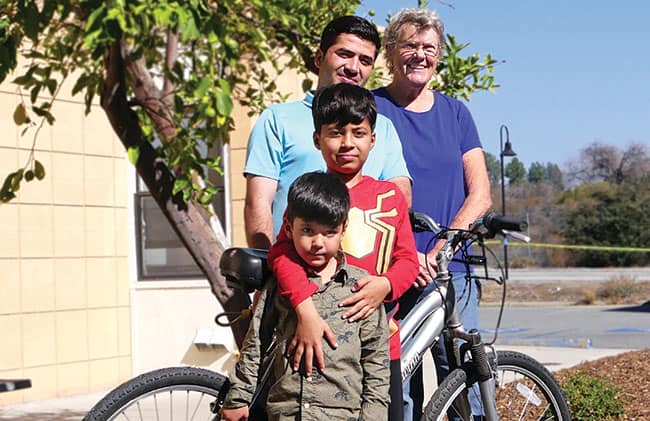Bike campaign eases refugees’ transportation issues

by Andrew Alonzo | aalonzo@claremont-courier.com
Since 2017 the Newcomers Access Center has had one goal, to help refugees — most recently Afghanistan citizens displaced by the Taliban — to reach new, independent lives in the United States. On Saturday, October 16 the center unveiled a new and unique effort to help these refugees gain a sense of independence while also easing their commute around the City of Trees.
The Claremont nonprofit launched a donation drive asking the community for good condition, usable bicycles in addition to helmets, padding and locks. The donated materials will be given to around 25 refugees temporarily living at dorms at the Claremont School of Theology, where the Newcomers Access Center is located.
“They know how to ride a bike, but they don’t have a way to get around,” Anne Thorward, founder and vice president of the Newcomers Access Center, said. “Currently I have three men and two women who need a bike and also a helmet and a lock. We have an eight-year-old boy and a five-year-old boy who apparently know how to ride a bike, and so it would be nice for them [to have bikes].”
The recent effort began as a way to provide refugees with two-wheeled transportation necessary for independence, according to Thorward.
“Up until this moment we had volunteers who would provide transportation for them, which is wonderful if volunteers want to do that, but that doesn’t work toward their independence. Our goal at Newcomers Access Center is to help refugees and immigrants become independent, and Southern California requires that you have some kind of wheels to make that happen,” she added.
Most, if not all of the present and incoming refugees at the center are Afghans who fled their country due to the Taliban takeover in August and came to the United States without any form of I.D. or driver’s license. But with a bike in California, pedestrians don’t necessarily need a form of identification to ride around town and get things done.
Thorward shared various ways the newcomers will benefit from having bikes, explaining first and foremost that the refugees need them to get to their English classes at the Claremont school district office over the coming weeks, which is a mile and a half away from the Claremont School of Theology.
“They might want to go to the grocery store, there’s a grocery store about three miles away. They may want to go to the place of worship that they want to go to. And obviously to their English classes and taking the children to school. The children will start school fairly soon, it’s just a paperwork issue,” Thorward continued.
In August 2021, tens of thousands of Afghanistan citizens became refugees in a matter of moments as they attempted to escape Taliban fighters who made their way through Afghanistan. On August 15, nine days after their initial attack, Taliban fighters took over the Afghanistan capital, Kabul, and effectively seized control of the country. [For a local opinion on the Taliban takeover, read Local Lens with Nangy Ghafarshad]
Between the Taliban takeover and the rush to get Afghan citizens out of the country before efforts ceased, citizens rapidly gathered any important belongings they could carry from their homes and headed toward Hamid Karzai International Airport, also known as Kabul International Airport. There, citizens, by chance, boarded a plane bound for another part of the globe, including the United States. Though they escaped the incoming Taliban regime, many citizens were essentially catapulted into a new life with no identity — no matter where they went.
The state of California was projected by the White House to take in some 5,000 Afghanistan refugees following the August 15 Taliban takeover. Aid from nonprofits, resettlement agencies and the state were planned to ease refugees’ transitions at the various airports.
Refugees were taken to either refugee camps like the one at the Pomona Fairplex — set to shut down on November 19 — military bases, or to groups like the Newcomers Access Center, that work with local resettlement agencies that then help the refugees find temporary housing. The Newcomers Access Center also provides services like citizenship courses and temporary housing themselves for refugees as the organization receives help from the Claremont School of Theology which provides them with numerous furnished dorms as temporary housing.
“The most critical need that refugees and immigrants have is temporary housing,” Thorward shared.
While finding housing is one of the center’s main concerns for refugees, giving them a proper way to get around the vast city of Claremont is now a close second.
“A bike is one more step toward independence,” Thorward added. “They will someday, not too distant future, be taking their driving test and getting their driver’s license and hopefully an automobile. But for the next few months, that’s probably not going to happen.”
The center is currently busy assisting about 25 refugees, including families with children, with residency and services to get them back on their feet. More refugees still reside at nearby military bases, the Pomona Fairplex, and other agencies and are expected to make their way to the Claremont organization in the coming weeks.
“As long as we have new refugees, because when they get on their feet and they move to permanent housing, we’ll get another group coming in and it’ll be the same thing,” Thorward shared.
The Newcomers Access Center is a certified 501(c)3 nonprofit organization and needs the community’s help to make their bike campaign a success. To avoid insurance costs and liabilities, the center is only asking for simple, pedal bikes — no motorized bikes or motorcycles. You can drop off bikes and at the center at 1401 N. College Avenue Building F. For more information on the bike campaign, visit here.
To learn more about the center or the other drives they currently have going on, call their line at (909) 455-3248 or email them at administrator@newcomersaccesscenter.org.










0 Comments